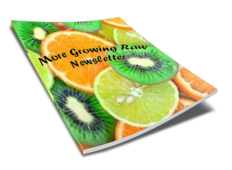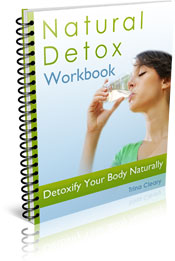|
Loss of Taste and SmellHow to Revive Taste Buds on the Tongue

A loss of taste and smell significantly reduces your enjoyment of healthy food. Learn how to revive the taste buds on the tongue so that you can savour the natural flavours of vegetables, fruit and other wholefoods. Of all the five senses taste is most likely to take a back seat, especially when compared to the importance of sight or hearing in our everyday lives. We may be able to imagine life without taste, but it’s harder to imagine life without our eyesight. Of course, we still wouldn’t willingly surrender our sense of taste, no matter how secondary in importance it seems. The astonishing thing to realise is that most of us are already living with a loss of taste and smell. Many of the poor lifestyle and food choices we’ve made throughout the years have diminished our taste buds’ abilities until our sense of taste functions way below its potential. We have no idea how powerful our taste receptors can be, and how much enjoyment of food we are missing out on! We can heal and revive our taste buds through a daily healthy eating plan that includes a lot of raw fruits and vegetables. Once your ability to savour flavours has returned, taste may very well become the last sense that you would be willing to part with! How Do Taste Buds Work?Contrary to what you may think, those little bumps you see on your tongue are not taste buds. Those are actually called papillae, and the taste buds are located deep inside them. Taste buds are actually little clusters of 50-100 cells. What happens is that taste buds have super sensitive microscopic hairs that pick up sensory information and send it to the brain, letting you know if something is sweet, sour, bitter, or salty.On average, most people have about 10,000 taste buds, and they are not all located on your tongue. Some are located on the insides of your cheeks, and some are on the roof of your mouth. Smell also has a lot to do with how we pick up information about the taste of something. When you chew food, the food releases some chemicals that travel up to the uppermost region of your nose where olfactory receptors are located. These receptors send your brain more information about the flavour of a food. So your taste buds are not solely responsible for taste sensation. This is why when you have a cold or a sinus infection, food may not taste the same or it may not seem to have much flavour to you. That’s because the olfactory receptors are blocked, making it so they can’t receive information. How Do Our Taste Buds Change As We Age?Although the average healthy person may have around 10,000 taste buds that are replaced every 10 days or so, after the age of 50 one starts to lose taste buds, and they do not regenerate very easily. An older person may only have 5000 taste buds, and they do not get replaced once they have run their course. This is why some food may taste stronger to a child than it does to an adult, or why someone who may not have been a salt user may start pouring salt liberally on their food the older they get, in an effort to recreate how something used to taste to them.We also confuse our taste buds through some of our choices. This results in a loss of taste and smell when our taste and olfactory receptors cannot function as they are supposed to. Smoking, ingesting pesticides or other chemicals or additives, and eating processed junk foods can put our taste buds in a position where they can no longer recognise what is a ‘green light’ food that should be ingested, and what is a ‘red light’ food that they should warn the brain about. Babies and toddlers often have no problem accepting mashed up carrots, or split peas – in fact, they often get excited by these foods that a lot of adults shun! If you were to offer a baby Diet Coke in a bottle, it would, thank goodness, probably make a face and not accept it. A naturally sweet raspberry smoothie on the other hand would probably be gulped down with enthusiasm. It is because their little bodies have not been contaminated yet, and they can trust their body’s balanced instincts about what food is good for them to eat to grow and be strong and healthy. They have not yet suffered a loss of taste and smell. It is through the introduction of processed foods, and also the cultural influence that these junk foods are somehow ‘desirable’, that over the years, their taste buds and minds get corrupted. And by the time we reach adulthood, most of us have completely forgotten what joy the taste of natural foods can give us. What Kills Our Tastebuds?Did you know that every year more than 200,000 people in the US alone go to a doctor because they are experiencing problems with their chemical receptors of taste and smell? Imagine how many more people are having issues with loss of taste and smell yet never make the effort to see a doctor about it! Worse even yet, most of these people may think that losing taste sensation over time is normal, and something that should just be accepted and dealt with!Chemicals, in all of their forms, are a big reason why we suffer a loss of taste and smell over time. In today’s day and age, we are bombarded with chemicals everywhere we look! Conventionally grown fruits and veggies are sprayed liberally with toxic pesticides whose residues still remain on the produce even after washing. Most processed foods contain chemical flavourings or colourings, which are not in any way good for the body and further confuse and destroy taste buds. Even aerosol sprays and unnatural fragrances can enter our mouth and nose through breathing, and can damage taste buds and olfactory receptors. Smoking also is a top cause of loss of taste and smell. Many people find that once they quit smoking, food takes on a whole new life to them. Once taste bud cells begin to regenerate and recover, they are able to experience flavour sensations that they may not have enjoyed for years. How Can We Heal Loss of Taste and Smell?Rejuvenating your taste buds is completely possible, easier than what you may think, and totally worth the effort!The first thing you should do is be honest with yourself about the chemicals you may be ingesting. Read packaging labels, and you may be surprised to find out just how many toxins you have been unknowingly putting in your poor body. When you buy produce, stick to your principles about buying organic. Not only does organic produce contain more nutrients than conventionally grown produce, but you can rest easy knowing that you are not consuming nasty pesticides. Think of it – if you saw a chemical spray filled with bug killer, would you spray it into your mouth? Of course not! But most people have no problem having someone else spray it on their apple that they will later on bite into. It just isn’t a very smart choice in a healthy eating plan when delicious organic produce can be found. If you are a smoker, think about quitting or at least reducing your cigarette consumption and begin to explore a whole forgotten world of flavours. The ‘enjoyment’ that you used to think came from smoking will be quickly replaced with a newfound enjoyment of food! Making a few shifts in your diet to include a lot of fresh fruits and veggies will allow your body to begin detoxing years of accumulated toxins. Once your body begins to flush some of this toxic load out, it will have a lot more energy and resources for cell regeneration – including those of your taste buds! A diet that does not overdo mucus-forming white flours or dairy will also help to keep your nasal passages clear, reviving your olfactory sensors. Taste Receptors And A Raw Food DietIf you are used to a diet of processed junk food, you may not understand at all how some people in this world can seem to get so much enjoyment out of something like a carrot stick or a fresh tomato out of the garden. Raw food weirdos, right? They can’t be serious! Why eat those things when you can have ice cream or a big greasy hamburger?But they know something you don’t know! People who have committed to a diet that includes a lot of raw foods have reset their body’s natural instincts and intuition towards food. Their taste buds are operating at their maximum potential, allowing them to enjoy every ounce of flavour in their food. After experiencing the natural explosion of sweetness from biting into a juicy, ripe red strawberry fresh from the garden, the fatty, chemical-laden ice cream loses its allure. Your taste receptors will begin to be less confused and will become more accurate, and white sugars may start to taste almost bitter compared to the natural sugars in fruits and sweet veggies. You will effortlessly be drawn towards more healthful foods, and soon may wonder how you ever let the other processed foods into your system. No one is saying that you have to have enthusiasm for a raw food diet overnight. Changing your old habits may take time and some flexibility, creativity, and at the very least an open mind. Can you picture yourself getting excited by a carrot stick? Maybe not. But what about a salad of bright leafy greens, shredded sweet carrots, plump tomatoes, salty olives, creamy avocado and a dressing made with the pungent flavours of many fresh herbs? You have to admit that it doesn’t sound half bad to at least try. Don’t sell yourself short. Upgrading to an increasingly raw food diet will automatically lower your toxin consumption. Your taste buds will start to regenerate and you’ll get the full impact of all of the incredible, diverse flavours that Mother Nature has provided. Soon enough, living with a loss of taste and smell will be a thing of the past!!! Articles Related to Loss of Taste and Smell – How to Revive Taste Buds on the Tongue: Back to Raw Vegetable Diet from Loss of Taste and Smell – How to Revive Taste Buds on the Tongue
|
Are you as healthy as you can be?
Take action to lift your energy and vitality levels beyond recognition.
Focus on
building healthy eating habits for just one month with
Veg Up and you’ll enjoy the effects for years. You will amaze yourself when you see how much more you can achieve.
More Growing Raw
Newsletter
Be sure to subscribe to "More Growing Raw" newsletter to receive monthly healthy eating tips, Growing Raw news and updates.
Most Popular Articles
- Green Smoothie Health
- Raw Food Health Levels
- Growing Vegetables in Containers
- Healthy Eating Plans
- List of Healthy Food to Always Eat Organic
- Growing a Vegetable Garden in a Polytunnel
- All Natural Detox Diet
Does your body need a fresh start?
Brighten up with all natural detox routines that give your body a cleansing push towards healthier patterns.
Learn how to
detoxify your body naturally. Your body is smart enough to clean itself without expensive detox pills and potions.








